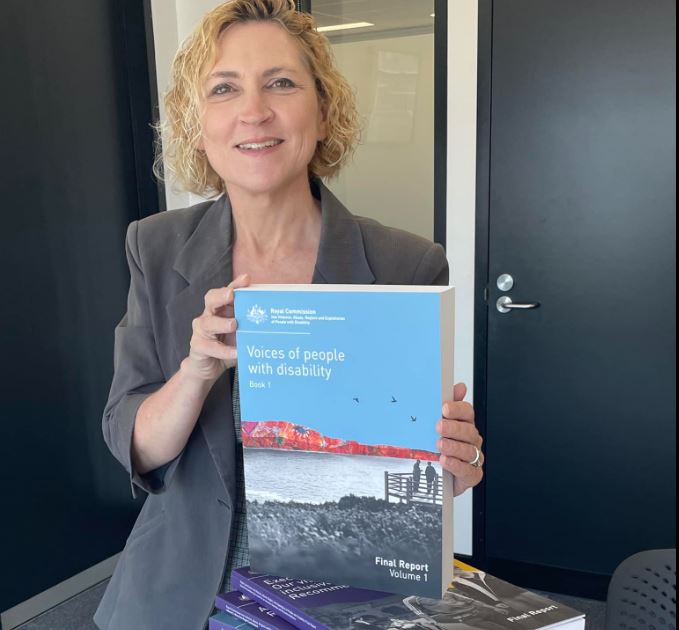“Transformational change” is needed if Australians want to build an inclusive society where those with disabilities are to be respected, according to the Royal Commission into Violence, Abuse, Neglect and Exploitation of People with Disability.
After more than four years of public hearings, private sessions and written submissions, the federal disability royal commission’s final 12-volume report and its 222 recommendations were released to the public today.
The proposed reforms aim to address a range of areas including human rights law, disability advocacy, guardianship, schooling, employment, the justice system, and housing.
Commissioners generated their findings after hearing from roughly 10,000 Australians who shared stories of violence, abuse, neglect, and exploitation.
“Our vision for an inclusive Australia envisages people with disability living free from violence, abuse, neglect, and exploitation in a more inclusive society in which human rights are protected and respected,” they wrote.
“For people with disability in Australia today, this remains a vision rather than a reality.”
About one in five Australians, or 4.4 million people across the country, identify as having a disability, according to Australian Bureau of Statistics data.
However, they face increased systemic barriers to education, employment, and housing, excluding them from many aspects of Australian life.
Many live in homes that do not accommodate their disabilities, others experience chronic homelessness, and those who work are often paid far below minimum wage.
Children with disabilities also face multifaceted issues such as exclusion from schooling environments where they can be discouraged from attending, socially shut out, overlooked by teachers, and deprived of necessary educational resources.
Those placed in youth detention are more likely to become enmeshed in the justice system, especially if they live with a cognitive disability.
All of this can mean people with disabilities are more prone to violence, exploitation, abuse, and neglect than in the wider community.
Australian Network on Disability CEO Corene Strauss said the report was “distressing” but a watershed moment for Australians with disabilities.
“The report’s 222 recommendations represent an acknowledgement that the thousands of people with disability who have shared their stories over the past four years have been heard,” she said.
“It demonstrates that we have a long way to go to change attitudes towards people with a disability, including the bigotry of low expectations.”
The report calls on the government to enact a Disability Rights Act to enshrine the international human rights of those with disabilities in domestic law and proactively prevent violence, abuse, neglect, and exploitation.
The Disability Discrimination Act 1992, as it currently stands, creates little incentive for institutions like schools and service providers to prevent discrimination, and must also be amended to promote equality.
Commissioners also recommended all states and territories establish legal frameworks to reduce restrictive practices, and called for a ban on non-therapeutic and non-consensual sterilisation of those with disabilities.
However, the report’s authors disagreed on whether governments should phase out settings for people with disabilities.
Commissioners Rhonda Galbally and Alastair McEwin – who both have disabilities – alongside Barbara Bennett, argued that such environments separated Australians with disabilities from the wider community, and called some settings a form of “segregation” incompatible with international human rights law.
Chair Ronald Sackville and commissioner John Ryan claim the criticisms create a false binary between wholly separated and inclusive settings, and the reality of those spaces are more nuanced.
Commissioners also recommended raising the age of criminal responsibility to 14 and establishing laws so people with disabilities who work in Australian Disability Enterprises are paid at least minimum wage by 2034.
First Nations people are uniquely marginalised with many reluctant to even identify with disability.
This led the commissioners to recommend forums and plans for Indigenous Australians.
Social Services Minister Amanda Rishworth MP vowed the federal government would take the findings of the commission seriously.
“We will work through this report in a diligent way and make a commitment to work with states and territories,” she told ABC Radio on Friday.
ACT Government response
Acting ACT Chief Minister Yvette Berry and Minister for Disability Emma Davidson welcomed the public release of the final report.
“This has been a long, but important process for people with disability and for every Canberran,” Ms Berry said.
She committed the government to working with people with disability to address the complex issues across a range of services and sectors raised in the Report.
“I am reconfirming our commitment to working with the disability community at all levels of government, in all sectors, to develop an ACT Government response to this Report,” Ms Berry said.
“The ACT Government takes this Report seriously and will carefully examine the recommendations in the context of the ACT. Our response will only be successful if we work collectively to achieve a more inclusive society.”
Ms Davidson acknowledged the advocacy of the community in calling for an investigation into violence, abuse, neglect, and exploitation of people with disability.
“I acknowledge the tremendous efforts by the community of people with disability who advocated for the Royal Commission, and I thank everyone who shared their experiences bravely, with integrity and dignity, over the past four and a half years,” Ms Davidson said.
“Witnesses shared harrowing experiences that should have absolutely no place in our community. I agree with the Report’s findings that all parts of our society must do more to prevent these things from happening to people with disability ever again.
“It is important we respond comprehensively to the Report so we do not miss any opportunity to achieve real change.”
The ministers said the development of the ACT Disability Strategy shows the ACT Government’s commitment to creating a more welcoming and accessible community and to improving the lives of the more than 80,000 Canberrans with disability.
“Following extensive consultation with the disability community, I look forward to the release of the ACT Disability Strategy which will provide a strong foundation on which to build better equality, access, opportunity, and inclusion as we develop our response to the Royal Commission Report,” Ms Davidson said.



